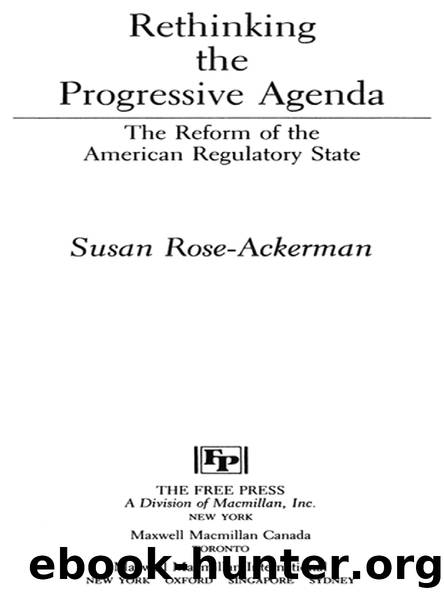Rethinking the Progressive Agenda by Susan Rose-Ackerman

Author:Susan Rose-Ackerman
Language: eng
Format: epub
Tags: SOC035000
Publisher: The Free Press
Published: 1992-07-15T00:00:00+00:00
PRINCIPLES OF FEDERALISM
The Reaganite commitment to lower levels of public spending, decentralized government, and aid to industry clashed in the administration’s approach to intergovernmental relations. The conflicts were handled on an ad hoc basis that had White House officials urging greater devolution of spending and regulatory authority at the same time as they supported mandates and preemptive statutes and worked to kill Revenue Sharing.
A political economy of federalism can provide a more consistent and principled framework for the development of policy than was evident in the Reagan program. Considerable research by public finance economists has laid the groundwork for a reform of intergovernmental relations that avoids slogans and provides arguments to counter the pleas of the self-interested.
Although Republican rhetoric linked devolution of authority to the states with regulatory and tax relief, these issues are distinct. The important normative question for the study of federalism is the proper location of decisionmaking and spending authority, given a particular public end. The key variables are: (1) the effects of externalities, (2) economies and diseconomies of scale in administration, (3) citizen participation, (4) the benefits of diversity versus uniformity, and (5) the possible existence of “prisoner’s dilemmas.” 29 The first three isolate a set of problems where the controversies are mainly empirical. The last two combine economic and political concerns and must be considered together since they overlap and intersect in complex ways.
Externalities
Economic theory provides a straightforward answer to the problem of drawing “optimal” jurisdictional boundaries. Individual states have little incentive to consider benefits and costs that accrue to out-of-state residents. Hence, jurisdictional boundaries should internalize these external effects. 30 For example, a single authority should regulate upstream and downstream water users. Dischargers and breathers in a single air basin should be included in the same jurisdiction. As a practical matter, however, this principle may lead to an unmanageable number of overlapping governmental entities. Thus federal matching-grant programs might be designed as a substitute. Without creating new government authorities or redrawing boundaries, grants could give states and localities an incentive to take responsibility for the externalities imposed on others. 31 Managing interstate externalities thus provides the first normative argument for incentive-based cooperative federalism.
Implementing matching-grant programs under this principle would itself be a complex enterprise. The federal government cannot simply set a single matching rate and leave it at that. Most interstate externalities are not imposed symmetrically. Instead, asymmetry is common, where one group of states (e.g., upstream polluters or energy-producing states) tries to impose costs on other states (e.g., downstream water users or energy-using states). The disadvantaged states have no corresponding costs they can impose on their upstream neighbors. The states’ interests in federal versus local control are clearly opposed in the asymmetric situation. Economic efficiency requires federal legislation to correct the externality, but, without some form of logrolling (e.g., federal grants), only the disadvantaged states will favor a federal law. 32
Existing matching-grant programs, however, often have proved an ineffective way to compensate the producers of interjurisdictional externalities. They lower the price of certain inputs (e.
Download
This site does not store any files on its server. We only index and link to content provided by other sites. Please contact the content providers to delete copyright contents if any and email us, we'll remove relevant links or contents immediately.
International Integration of the Brazilian Economy by Elias C. Grivoyannis(107872)
The Radium Girls by Kate Moore(12012)
Turbulence by E. J. Noyes(8036)
Nudge - Improving Decisions about Health, Wealth, and Happiness by Thaler Sunstein(7689)
The Black Swan by Nassim Nicholas Taleb(7097)
Rich Dad Poor Dad by Robert T. Kiyosaki(6596)
Pioneering Portfolio Management by David F. Swensen(6280)
Man-made Catastrophes and Risk Information Concealment by Dmitry Chernov & Didier Sornette(6001)
Zero to One by Peter Thiel(5782)
Secrecy World by Jake Bernstein(4736)
Millionaire: The Philanderer, Gambler, and Duelist Who Invented Modern Finance by Janet Gleeson(4457)
The Age of Surveillance Capitalism by Shoshana Zuboff(4272)
Skin in the Game by Nassim Nicholas Taleb(4232)
The Money Culture by Michael Lewis(4186)
Bullshit Jobs by David Graeber(4177)
Skin in the Game: Hidden Asymmetries in Daily Life by Nassim Nicholas Taleb(3986)
The Dhandho Investor by Mohnish Pabrai(3750)
The Wisdom of Finance by Mihir Desai(3726)
Blockchain Basics by Daniel Drescher(3571)
